
Magento Resources: Learn Magento 2 And Adobe Commerce
Are you looking for the best Magento resources to optimize your store? Magento resources offer tools, guides, and extensions to help your ecommerce platform thrive.
This article will cover beginner-friendly and advanced Magento resources.
Key Takeaways
- Adobe Commerce offers advanced features for businesses of all sizes.
- Magento Open Source provides flexibility and scalability at no cost.
- Tips for customizing your Magento store and insights into the Magento Marketplace.
- Tools to use Magento extensions to enhance your store’s functionality.
- Open source resources provide flexibility and community support.
- Proper resource management improves store performance and user experience.
-
Why Is Using Magento Ecommerce Resources Important For Magento Sites?
-
Best Practices For Resource Management Using Complex Magento Concepts
Why Is Using Magento Ecommerce Resources Important For Magento Sites?
The Magento Marketplace offers a vast collection of high-quality extensions, designs, and themes. They provide valuable resources for enhancing and customizing your store. With thousands of extensions available, you can customize your store to meet your specific business needs. The Magento platform offers two primary versions:
- Community Edition
- Enterprise Edition
Community Edition vs. Enterprise Edition
| Edition | Key Feature | Description | Benefit | Business Size | Budget | Scalability | Support |
|---|---|---|---|---|---|---|---|
| Community Edition | Open-Source, Highly Customizable | Free, customizable, suitable for small to medium-sized businesses. | Flexibility, cost savings, community support. | Small- to medium-sized businesses. | Free. | Limited scalability. | Community support. |
| Enterprise Edition | Advanced Capabilities, Dedicated Support | Paid, advanced features, dedicated support, suitable for large enterprises. | Advanced security, scalability, dedicated support. | Large enterprises. | Subscription-based. | High scalability. | Dedicated support. |
With Magento development resources, you can customize your store to meet your needs. They can help you optimize your store for performance, security, and SEO. They can also help you scale your store as your business grows. They provide access to a community of developers and experts. They can help you troubleshoot and resolve issues.
Tools To Create And Manage A Thriving Digital Commerce
1. Development Tools
When it comes to developing and managing your Magento 2 extensions, having the right tools is a must. For example:
- Magento CLI: The Magento Command Line Interface (CLI) is a powerful tool. It allows you to manage your Magento ecommerce store from the command line.
- Composer: Composer is a dependency manager. It helps you manage your site's dependencies and libraries.
- Git: Git is a version control system. It allows you to track changes and collaborate with others on your Magento 2 store.
2. Performance Optimization
A slow-loading Magento 2 platform can be a major turn-off for customers. You can check the following resources to learn about performance optimization:
- Varnish Cache: Varnish Cache is an effective caching tool. It can significantly improve the performance of your Magento web.
- Redis: Redis is an in-memory data store. It can help improve your website's performance and scalability.
- Elasticsearch: Elasticsearch is a search engine. It can enhance your Magento's search functionality and performance.
3. Security Enhancements
Security is a top priority for any ecommerce business. Consider the below essential resources to learn about for security enhancements:
- Two-Factor Authentication: Two-Factor Authentication adds an extra layer of security to your site. It maintains trust & complies with data protection regulations like GDPR or PCI DSS. Thus, it makes it harder for hackers to gain access.
- Security Scan Tool: The Security Scan Tool is a must-have tool. It can help identify and fix security vulnerabilities in your site.
- Malware Detection: Malware detection tools can help identify & remove malware from your site. They keep your customers and data safe.
Beginner-Friendly Resources To Learn About Magento
1. Magento Community
The Magento community consists of over 3 million developers worldwide. Due to Magento's scalability, it is an invaluable resource for learners at all levels. Whether you're running a large or small business, it is suitable for new and experienced users.
2. Official Adobe Commerce Documentation
Magento 2 provides detailed technical documentation that covers all aspects of the platform. This makes it a valuable resource for learners. Topics such as installation, configuration, customization, theming, and module development are thoroughly covered. These also include sample codes and step-by-step guides. They help users in the implementation process.
3. Magento 2 Blog Resources
Read expert blogs to stay updated with the latest Magento trends and functionality. These blogs offer valuable insights into Magento 2. They also provide a deep dive into different aspects of the platform. They also help both developers and store owners enhance their Magento skills. For instance:
i. MGT Commerce
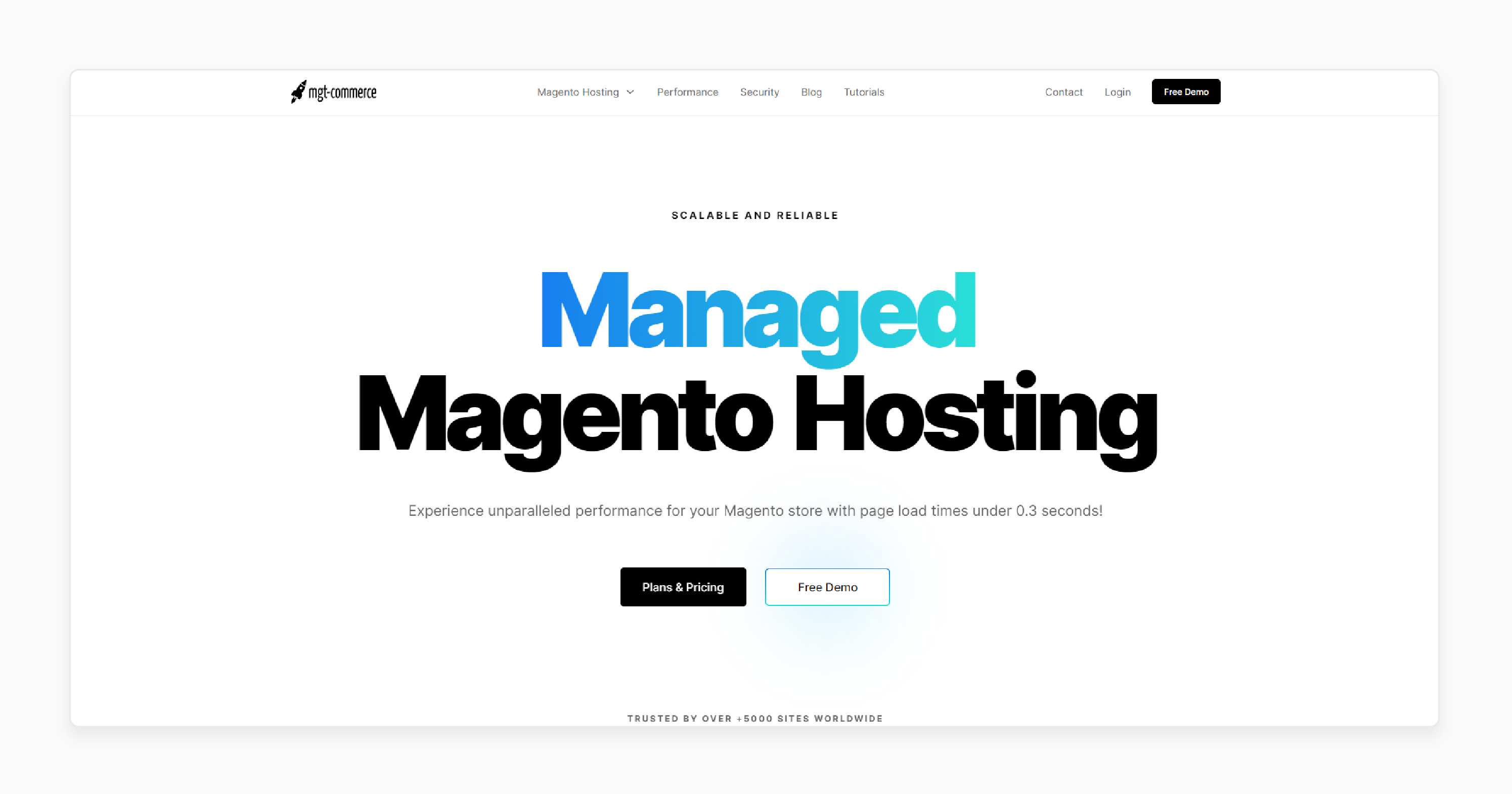
MGT Commerce keeps you informed with everything Magento-related. They help you understand the basics and master the latest updates. Their blog offers comprehensive tutorials for beginners and seasoned developers alike. It covers topics such as custom extensions, performance optimization, and security.
ii. Magento DevDocs
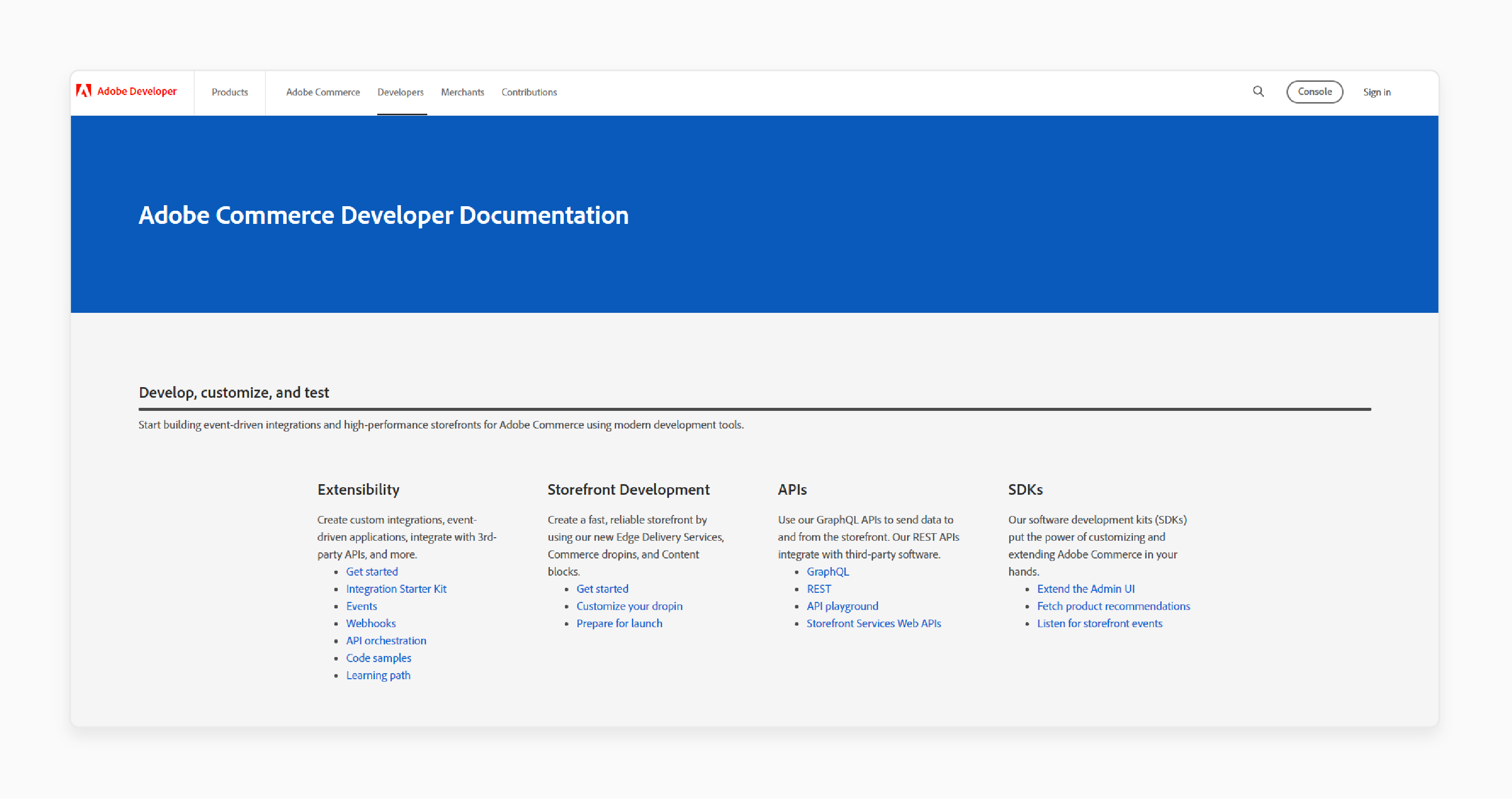
The Magento DevDocs, also known as the Adobe Commerce Developer Guide, covers technical topics. These range from system requirements to front-end and back-end development. With clear instructions, screenshots, and code examples, DevDocs provides step-by-step guidance. It ranges from customization to extension development.
4. Video Tutorials
Video tutorials are another valuable resource for mastering Magento 2. They offer visual instruction that can make complex topics easier to understand. Consider the below YouTube channels that help you learn from experienced Magento developers:
i. MGT Commerce
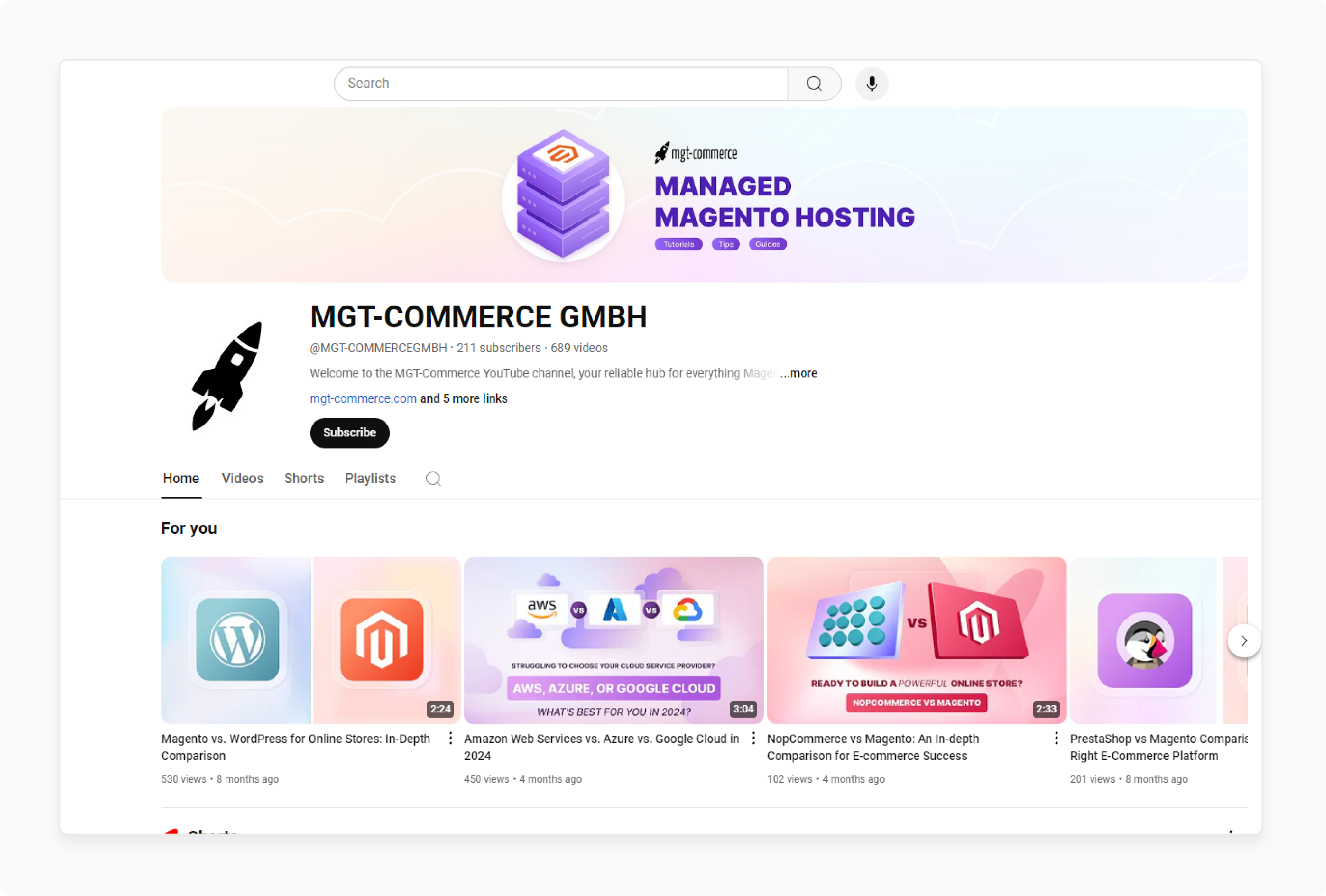
MGT Commerce's YouTube channel offers a range of tutorials & guides on their website. Their resources cover various aspects of Magento 2. It includes performance optimization, security enhancements, and advanced development techniques. Their tutorials are designed for developers, SysAdmins, and DevOps. They provide in-depth knowledge and hands-on experience.
ii. Max Pronko
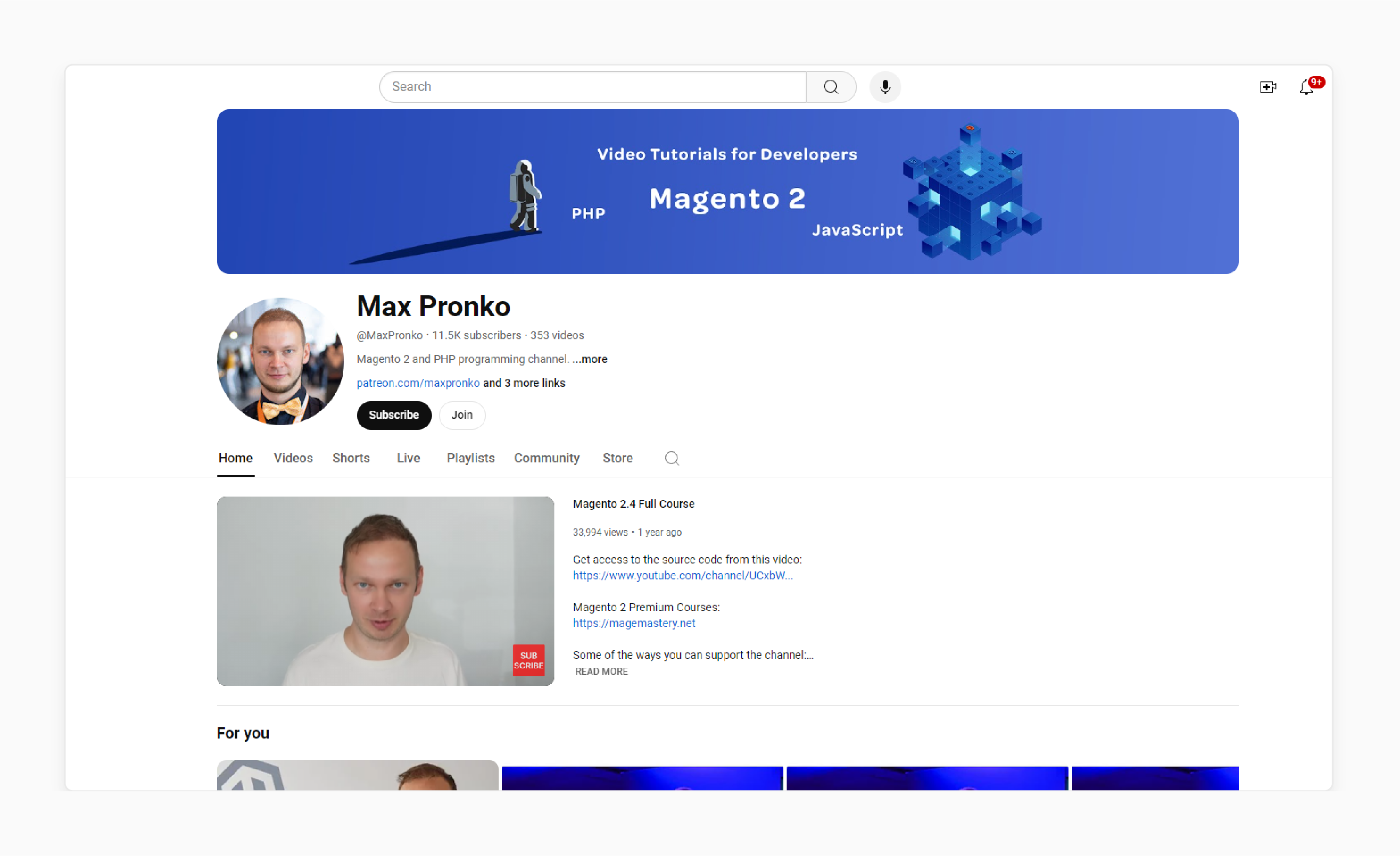
Max Pronko’s YouTube channel features a wide range of Magento 2 tutorials. These range from basic concepts to advanced techniques. His teaching style makes Magento 2 accessible to learners of all levels. It helps users build custom modules, optimize performance, and explore the latest features.
iii. Mark Shust
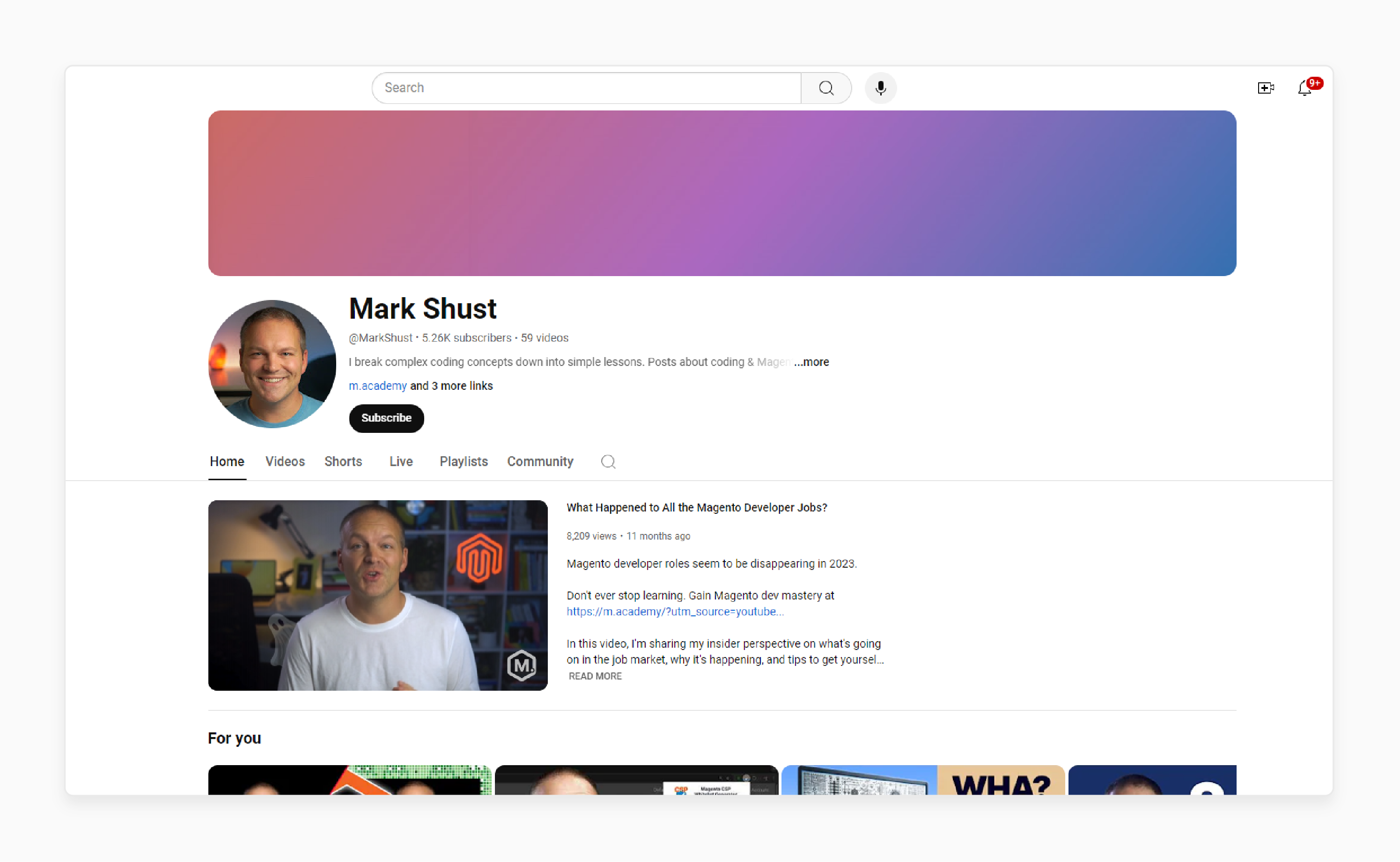
Mark Shust's YouTube channel offers detailed tutorials on modules, themes, and third-party integrations for Magento 2. He breaks down complex topics into easily digestible segments. This is why his channel is a go-to resource for users.
5. Expert Magento Developers
Learning from industry experts with years of experience enhances your knowledge of Magento. Many expert developers share their insights through blogs and offer practical examples. These help learners navigate the platform more effectively.
i. Alan Kent
As Magento’s Chief Architect, Alan Kent has played a pivotal role in the platform’s development. His blog covers a wide range of topics, offering valuable insights for developers. They range from Magento’s architecture to performance optimization.
ii. Alan Storm
Alan Storm, a veteran in developing flexible ecommerce platforms, shares detailed articles. He talks about advanced development techniques, extensions, and debugging. His well-researched posts are an excellent resource for developers. They are beneficial when looking to master Magento’s more complex features.
6. Books
Books are another excellent way to learn Magento 2 offline. They offer structured content with real-life examples to help you understand the platform. Here are two highly recommended books:
i. Magento 2 Development Cookbook
Written by Bart Delvaux and Nurul Ferdous, this book provides practical tips. It also offers solutions to common development challenges. It makes it a must-read for Magento 2 developers.
ii. Mastering Magento 2
Bret Williams’ Mastering Magento 2 covers everything from installation to store development. This makes it ideal for both developers and e-commerce professionals.
7. Online Courses
Depending on your expertise level, there are a variety of online courses available. They cover Magento 2 from beginner to advanced levels. These courses offer valuable insights for agencies, merchants, and developers alike. For instance:
i. Complete Course on Magento 2
This course, available on Udemy, guides learners through Magento 2's setup. It provides details on directory structure, configuration files, and more. It’s ideal for anyone looking to gain a comprehensive understanding of the platform.
ii. LinkedIn Learning
LinkedIn offers a free course called "Magento Community Edition 2 Essential Training". This program is perfect for developers, business owners, and ecommerce experts looking to solve Magento-related challenges.
Best Practices For Resource Management Using Complex Magento Concepts
| Best Practice | Description | Benefits |
|---|---|---|
| Regular Updates | Regularly update your Magento installation and extensions to ensure security and performance. | Enhanced security, improved performance, and access to new features. |
| Resource Monitoring | Monitor resource usage and performance to identify bottlenecks and optimize your Magento store. | Improved performance, reduced downtime, and better resource allocation. |
| Caching Strategies | Implement proper caching strategies to reduce server load and improve page load times. | Faster page loads, reduced server load, and enhanced user experience. |
| Database Optimization | Optimize your database regularly to improve performance and reduce data redundancy. | Improved performance, reduced data redundancy, and faster data retrieval. |
| Full Page Cache | Use Full Page Cache (FPC) to cache entire pages and reduce server load. | Faster page loads, reduced server load, and improved user experience. |
| Block Caching | Use Block Caching to cache individual page components and reduce server load. | Faster page loads, reduced server load, and improved user experience. |
| Object Caching | Use Object Caching to cache individual objects and reduce database queries. | Faster data retrieval, reduced database queries, and improved performance. |
| Cache Management | Regularly review and adjust cache settings to ensure optimal performance. | Improved performance, reduced downtime, and better resource allocation. |
| Varnish Cache | Use Varnish Cache to improve performance and reduce server load. | Faster page loads, reduced server load, and improved user experience. |
| Redis Cache | Use Redis Cache to improve performance and reduce database queries. | Faster data retrieval, reduced database queries, and improved performance. |
| Use Magento CLI | Use the Magento CLI to build a successful online store and perform tasks efficiently. | Improved efficiency, reduced errors, and better resource management. |
| Implement Cache Warming | Use cache warming strategies to generate proactively. Also, cache pages before real users request them. | Improved performance, reduced server load, and better user experience. |
| Monitor Cache Hit Rate | Regularly monitor the cache hit rate to ensure optimal performance. You can also adjust cache settings as needed. | Improved performance, reduced downtime, and better resource allocation. |
| Use PHP OPCache | Use PHP OPCache to compile and cache PHP scripts into bytecode. It improves performance and reduces server load. | Improved performance, reduced server load, and faster data retrieval. |
Advanced Resources to Learn About Magento
1. Magento.com
Magento.com, the official Magento website, is a reliable resource for Magento learning. It offers a wealth of information, including blogs, solution-oriented articles, and a community. It provides valuable insights for users ranging from beginners to expert developers.
2. U.Magento.com
Magento U is the official learning platform. It provides training, certifications, and instructional videos. It offers three modes of learning:
- On-Demand Online: Flexible courses available from anywhere.
- Instructor-Led Classroom: A traditional classroom setting to interact with peers and instructors.
- Instructor-Led Online: Real-time virtual classes for those who cannot attend in person.
After completing courses, users can further their expertise by becoming Magento Certified Professionals.
3. Magenticians
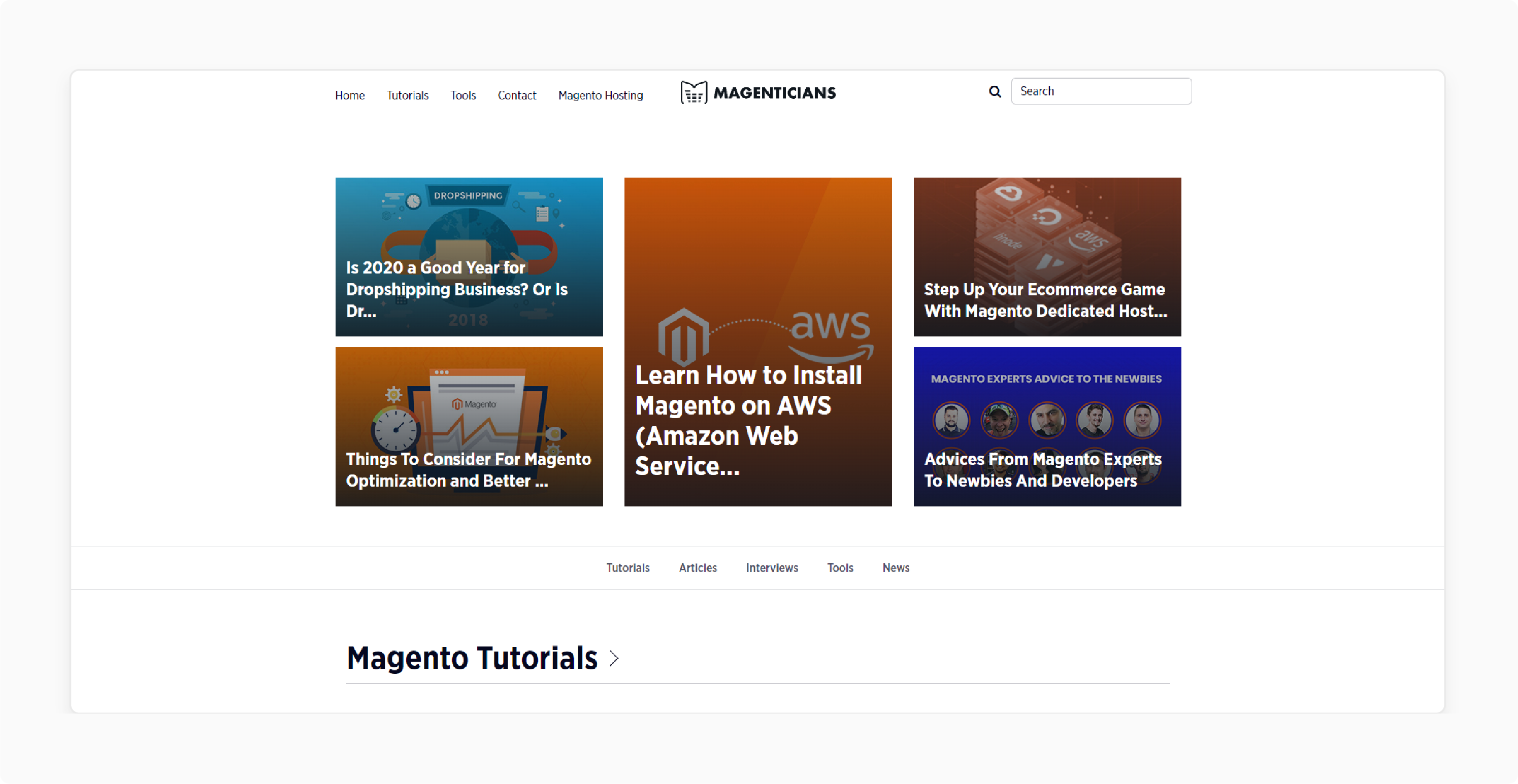
Magenticians is a top third-party blog for learning Magento. It covers technical details, marketing insights, updates, and more. This resource is ideal for developers and store owners. They can seek comprehensive information on eCommerce topics.
4. Forums & Community
The Magento Forum plays a solid and active role in the platform's success. Active community members provide valuable support. They share knowledge across public forums. Examples include Magento Stack Exchange, Reddit, and other platforms. It makes it easier for users to resolve issues and learn about Magento.
5. Product Blogs
You can learn Magento by following blogs from solution providers like MGT Commerce. These blogs offer in-depth articles and resources. You can use these resources to learn Magento through detailed guides & knowledge bases.
6. GitHub Repositories
GitHub repositories offer a wealth of Magento-related code and projects. You can find open source extensions, themes, and other resources. They help you learn and improve your Magento skills.
7. Local Magento Meetups
Local Magento meetups provide a great opportunity to network with other Magento developers. They help you learn from their experiences. You can discuss the latest trends and share knowledge with Magento projects.
8. Online Developer Communities
Online developer communities offer a platform to ask questions. These include Magento Stack Exchange, Reddit's r/Magento, and Magento forums. Through these platforms, you can share knowledge and learn from other developers.
Advanced Customization With Magento Resources
| Feature | Description | Benefits |
|---|---|---|
| Magento Extensions | Use Magento extensions to customize and enhance your store's functionality. | Improved performance, increased scalability, and better reliability. |
| Magento Themes | Leverage Magento themes to create a unique and engaging user experience. | Improved customer experience, increased conversions, and better brand identity. |
| Magento Modules | Use Magento modules to add custom functionality and features to your store. | Improved performance, increased scalability, and better reliability. |
FAQs
1. How does Adobe Commerce differ from other ecommerce solutions?
Adobe Commerce, the evolution of Magento 2, stands out as an enhanced ecommerce solution. It combines the essential tools related to Magento with Adobe's advanced features. This platform offers a vast commerce marketplace for extensions. They enable you to tackle complex tasks with ease. Many consider it one of the best Magento 2 experiences available. It is especially beneficial for larger businesses needing scalability and advanced features.
2. What important resources should I focus on to understand Magento effectively?
Magento is an excellent ecommerce solution that helps businesses of all sizes to thrive online. When starting with Magento, it's essential to focus on important resources. They will help you understand Magento's core features, extensibility, and best practices. These include official documentation, community forums, video tutorials, and beginner-friendly courses.
3. How can I get started with Magento and keep costs low while developing a digital storefront?
To get started and keep costs low with Magento, consider using Magento Open Source. It is a free version. You can start developing your digital presence without a significant initial investment. You can handle many administrative tasks with our commerce platform's built-in features. It reduces the need for expensive third-party solutions. As you grow, explore free or low-cost extensions from the Magento Marketplace. Take advantage of numerous free guides on Adobe Commerce (formerly Magento) available online. They enhance your skills and maximize your store's potential without breaking the bank.
4. How quickly can I spin up my digital storefront with Magento?
Magento offers a range of essential tools to create your online store efficiently. They help you get started and spin up your digital storefront quickly. This way, you can focus on Magento's core features and popular extensions. While the setup time can vary based on your specific needs, many users can launch a basic store within a few weeks. You can leverage Magento's sample data, pre-built themes, and user-friendly admin panel. Community resources & documentation provide the best of their knowledge to guide you through the process. They help you transform your ecommerce vision into reality.
5. How can Magento's resources help me build memorable shopping experiences?
Magento offers tools that help early entrepreneurs & ambitious developers create standout online experiences. The platform provides customizable templates to help you along the way. It allows you to establish a professional-looking store quickly. It builds memorable shopping experiences with step-by-step guides on all things. They range from basic setup to advanced features. These resources enable you to focus on crafting unique customer journeys. However, the platform's built-in functionalities reduce administrative tasks. Magento's ecosystem supports your growth with scalable solutions and extensive customization options.
6. How does Adobe's ecommerce solution help streamline the online experience?
Adobe's ecommerce solution enhances your online experience and reduces administrative tasks. With this solution, you'll have the essential tools to manage your store efficiently. The commerce marketplace provides extensions and integrations to automate various tasks. It frees up your time for strategic decisions. Also, Adobe fosters thought leadership through community engagement, webinars, and active Slack channels. Here, you can connect with experts and stay updated on industry trends. This ecosystem helps you sell products. It also supports your growth with valuable insights and resources from industry leaders.
7. How often should I update my Magento resources?
Updating your Magento resources regularly maintains security, performance, and compatibility. Aim to review and update your Magento core, extensions, and themes at least quarterly. However, for essential security patches, update as soon as they're released. Create a staging environment to test updates before applying them to your live store. Subscribe to Magento's security and update notifications. Follow reputable Magento blogs to stay informed about the latest releases & best practices. Frequent updates are essential. However, always balance them with the stability of your store and plan updates during low-traffic periods.
Summary
Magento resources optimize your e-commerce platform so that you can make informed decisions. They help you:
- Leverage a variety of third-party solutions to enhance your store's functionality and performance.
- Create a unique and efficient Magento store.
- Optimize performance and improve security.
- Create a seamless shopping experience for your customers.
- Enhance functionality and customization options.
Navigate open source resources & leverage the right tools for success with Magento optimized server.







